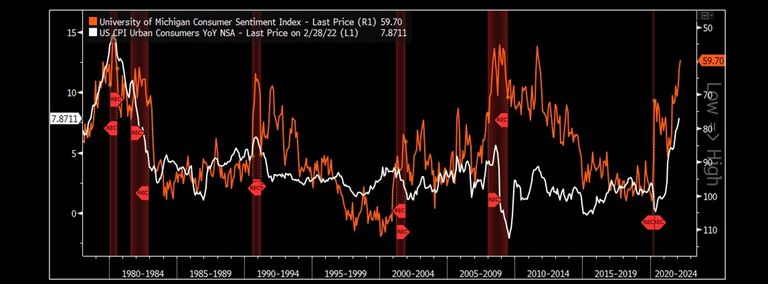It seems as if complex systems (like the economy) deserve an equally complex solution when issues arise.
But sometimes the simplest answer is the best one.
US Inflation and Consumer Sentiment

Consumer Sentiment Falling Fast
U.S. Headline CPI(YoY%) vs. University of Michigan Consumer Sentiment Index (Y value Inverted)
The University of Michigan’s Sentiment Index dropped to 59.7, from 62.8 in February, data released last Friday showed.
It means consumers feel stress to spend money regarding high inflation and uncertain economic status.
The median estimate of economists in a Bloomberg survey called for a reading of 61. Consumers expect prices to rise 5.4% over the next year, the highest reading since 1981, according to the data.
U.S. consumer sentiment tumbled in early March to the lowest since 2011 and year-ahead inflation expectations rose to a four-decade high in the aftermath of Russia’s invasion of Ukraine.
Prices at the grocery store and gas pump were rising even before the war, which is now making those purchases that much harder.
Higher Prices to defeat Inflation?
In the case of inflation, the best deterrent for higher prices is higher prices.
At a certain point people will just stop shelling out for expensive goods and services.
If wage increases were outpacing inflation, then we could sustain higher prices because people would still wind up with more money in their pocket. But they’re not. So at a certain point, higher prices will weigh on demand because people have less consumption firepower. They simply can’t afford to buy as much “stuff”.
This would naturally curb demand, which in turn would put pressure on companies to reduce costs to retain business. And if they don’t, people will forego what they have to offer (or they’ll simply go elsewhere).
The current situation obviously isn’t that simple, but it’s not that complex either. “Consumers” are already getting squeezed. And consumer sentiment is tanking.
Powell himself suggested raising rates and reducing the Fed’s balance sheet is a solution to higher prices pressuring consumers.
This means Fed officials acknowledge financial conditions are likely to tighten and economic growth is likely to slow.
They’re banking on a strong labor market that’s resilient enough to handle this, but only time will tell.
What will happen and What should I do
All that matters is the actions policymakers actually take.
And It may not be helpful to consider unpredictables on my investment or daily life decisions.
Regardless of the status of war and COVID-19 pandemic, overall supply and balance may have its own new positions. Even in war and much disasters like pandemic, we should go live and find optimistic way to make our lives better.